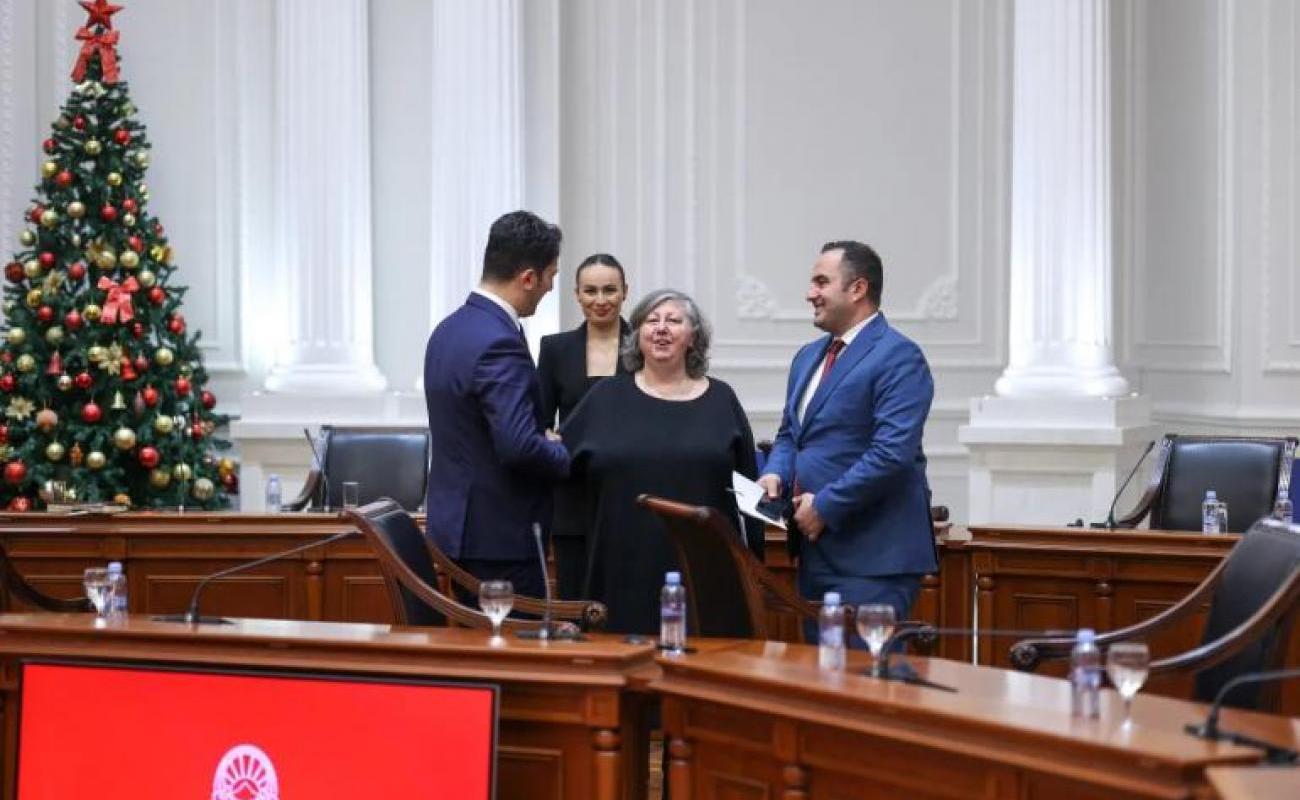New Rulebook on functional assessment of children and youth with disabilities adopted

Skopje, 12 January 2023 - Today, the Minister of Labor and Social Policy, Ms. Jovanka Trenchevska, the Minister of Health Mr. Bekim Sali and the Minister of Education and Science, Mr. Jeton Shaqiri signed a Rulebook on functional assessment of children and youth with disabilities aimed to facilitate access of children and youth up to 26 years of age to support services and cash benefits.
The new Rulebook is part of the major reform of the assessment model for children and youth with disabilities in the Republic of North Macedonia led by the Ministry of Education and Science, the Ministry of Labor and Social Policy and the Ministry of Health with UNICEF support.
“Inclusion and promotion of the rights of people with disabilities is our priority, that is our commitment. Equity is our work postulate and that is why we prioritize recognizing the strengths of the people with disabilities and providing space for them to develop to their full potential,” said the Minister of Labour and Social Policy, Jovanka Trencevska.
"The Rulebook is an important instrument to increase the level of inclusiveness in the education system. It will be easier to create an individual education plan and develop adjusted programme and at the same time it will be easier to define the inclusive team, i.e. what type of professional staff should provide support to the student and whether educational assistance or personal assistant will be needed," emphasized the Minister of Health Jeton Shaqiri.
“So far, the professional assessment bodies have carried out over 2100 assessments, and in parallel they have started issuing control assessments. With the completion of the procedure for the opening of all regional assessment bodies, we expect much larger number of performed assessments, which should respond to the real needs. Regarding the costs, we note that parents are exempt from any payment for performing the assessment,” said the Minister of Health Bekim Sali.
“It is a great achievement that the health, education and social protection systems in North Macedonia work together to improve the recognition of rights and improve living standards for children and youth with disabilities,” said Patrizia DiGiovanni, UNICEF Representative. “There is more work ahead of us to complete the reform, especially in terms of securing premises and human resources for all the regional disability assessment bodies. I hope that this event will prompt the preparation of an action plan that would guide different stakeholders in the process. UNICEF remains ready to further support this critical reform for the benefit of every child in the country.”
The new assessment model puts an emphasis on the active role of parents in the assessment of their children. It also empowers parents with professional advice on how they can further support their children. This marks a vast improvement over the previous system, which was based strictly on medical diagnosis and lacked a needs-focused approach.
The new assessment model is meant to identify developmental disabilities in children, and the needs for support that would ensure each child has a chance to achieve her/his full potential.
Regional assessment bodies in Bitola, Ohrid, Gostivar, Veles, Kumanovo, Shtip, Strumica and Skopje are equipped to provide professional guidance to parents of children with disabilities and link them up with support services in the areas of healthcare, education and social protection. The bodies are staffed not only with health professionals, but also with social workers, psychologists, and special educators. They will expand their services to identify limitations in the environment that prevent children with disabilities from active and full participation in society, such as inaccessible infrastructure, prejudices and negative attitudes in the local communities.
A national body is also established to coordinate and supervise the work of the regional disability assessment bodies, collect data to identify bottlenecks in provision of support services to children and youth with disabilities and address them in partnership with the line ministries. In the process of establishing the disability assessment bodies and implementing the legislative amendments, the National Coordinating Body on Implementation of the UN Convention on the Rights of Persons with Disabilities played a key role in liaising with different institutions.
For the needs of the new model, extensive changes have been made to the legal framework with UNICEF support, such as the laws on social and child protection, the law on primary education, the law on health care, which systemically regulate this issue. The new Rulebook regulates the functioning of expert bodies for assessment, the method of performing the assessment, but also the method of providing additional support in the field of education, healthcare, social protection and child protection.
The disability assessment bodies will be funded by the Ministry of Health and will be hosted by the Public Health Center Skopje. The Ministry of Labor and Social Policy, the Ministry of Education and Science, and municipalities are providing some of the premises for the functioning of the bodies.
The new Rulebook is in line with the International Classification of Functioning, Disability and Health (ICF) approved by the World Health Organization in 2001.
